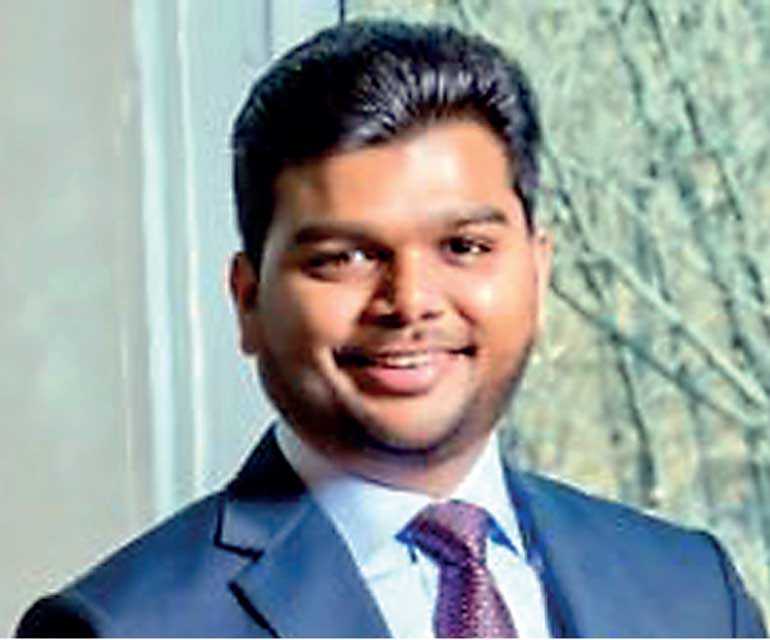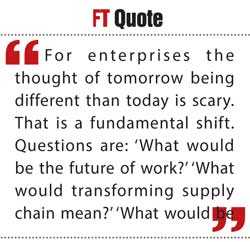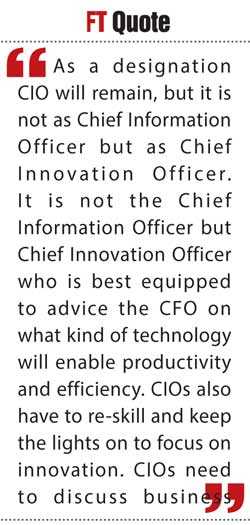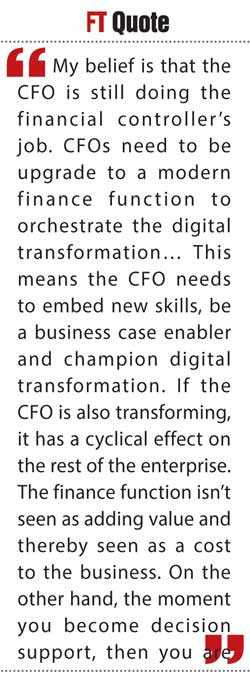Friday Feb 27, 2026
Friday Feb 27, 2026
Wednesday, 21 November 2018 00:00 - - {{hitsCtrl.values.hits}}
Given the need to remain competitive, relevant and successful, many enterprises are pursuing digital transformation. This journey is challenging, but to get it right enterprises need to have a proper understanding of their status quo and desired goals.
 |
Oracle Asia Pacific SaaS Leader – Office of Finance, Operations and Digital Supply Chain Guruprasad Gaonkar |
Daily FT, which attended the Oracle OpenWorld 2018 in San Francisco recently, caught up with Oracle Asia Pacific SaaS Leader – Office of Finance, Operations and Digital Supply Chain Guruprasad Gaonkar to find out why enterprises need to embrace digital transformation, the benefits and how to get it right as well as the role of CFO and CIOs.
Guruprasad Gaonkar or Guru is responsible for Oracle’s digital transformation orchestration across industries for the Office of Finance (CFO), Operations (COO), Information Technology (CIO) and Digital Supply Chain. In this role he heads the ERP and Digital Supply Chain teams for Asia Pacific markets, namely Australia and New Zealand, Southeast Asia and India.
Based in Singapore, Guru believes that a big differentiator separating highly-successful CXOs from others will be the ability to operationalise and execute company strategy based on data-driven insights. He is also passionate about identifying and sharing trends in all areas of digital finance, operations and supply chain. Guru and his team work with CFOs, COOs and business leaders to deliver transformative approaches that enable organisations to transform and modernise their enterprise.
Here are excerpts from the interview with Guru:
By Nisthar Cassim
Q: What are the compelling reasons for enterprises to pursue digital transformation?
A: In the past, a couple of countries acted as economic pole points and the rest were an extension of the supply chain. Today Asia is seeing a new economic model. Countries in the region including Sri Lanka are export-oriented with a focus on manufacturing. However we see a lot of investments in the services industry such as hospitality, retail, IT, telecom, etc. This has given rise to a lot of Asian conglomerates.

Secondly, we also see new business models whilst industrial revolution 4.0 is disintegrating the value chain where production can be done elsewhere. So technically one need not have integrated production planning and execution in single location. On the commerce side it is now actually integrating the distribution. It is orchestrating disintegration at the back end and at the front end it is integrating from a commerce perspective.
Thirdly, we are also seeing a new political model. Countries are focusing a lot on shared cyber security intelligence. All these prompt Asian companies to ask three questions:
Firstly, how do I grow? It is about mergers and acquisitions, entering new markets, launching new products, etc.
Secondly, people are asking ‘what is my production and delivery footprint?’ This is where digital transformation comes in, how firms can look at data driven decisions in finance, HR, procurement, in sales and marketing. We are also seeing how to use new technology not as a buzz word but actually putting technology into use. Additionally, roles of the CFO and CIO are being questioned and redefined.
The third question firms are asking is, ‘what should be my new operating model?’ Firms have invested a lot on past Enterprise Resource Planning (ERP) solutions. I feel in the past ERP has been a cost to business than adding value to enterprises. There also has been costly maintenance and upgrades in addition to multiple software applications.
So these are the three questions being asked at enterprise level. In this context, digital transformation is a journey which involves many steps by which an enterprise can be transformed from what it is today to what you want to be tomorrow.
The issue is, what does tomorrow look like? For enterprises the thought of tomorrow being different than today is scary. That is a fundamental shift. Questions are: ‘What would be the future of work?’ ‘What would transforming supply chain mean?’ ‘What would be the future of finance?’
The finance function or CFO needs to be upgraded like from economy to business class. I don’t think the office of CFO needs to be transformed; they need to upgrade to a modern finance function to orchestrate the digital transformation which also means experimenting things you haven’t done before. It could be new business models or products. It is the CFO’s responsibility to validate such a course. If the CFO is coming from an old world, he or she won’t be supportive of digital transformation. This means the CFO needs to embed new skills, be a business case enabler.
Some of the new innovations such as IOT and blockchain being rolled out also have tax implications. On the distribution side, a new ecommerce model – the CFO will be required to validate and also strategise as to how best it can be monetised. The way any business model is priced today and will be priced tomorrow will be different. So the CFO is also a becoming an advisor for new pricing models.
Given all these scenarios, the CFO needs to upgrade to a modern business function to understand and champion digital transformation.
Q: Are you making a case that onus of digital transformation lies with the CFO and not the CEO/board?
A: Digital transformation is definitely a board agenda. Today every business function needs to be transforming. The role of the CFO is critical. If the CFO is also transforming, it has a cyclical effect on the rest of the enterprise. Modern finance requires a CFO not only to play the traditional role of advisor but also an enabler.
When ERP was discovered or invented, book-keepers became accountants who turned into financial controllers and then CFOs. So what is today’s CFO doing? My belief is that the CFO is still doing the financial controller’s job. If you ask the CEO what he or she expects from the CFO, they expect decision support not transaction support. They don’t want the CFO to be answering questions of what you can do and what you cannot do but what is possible within the constraints of an enterprise. This is where the advisory and enable roles comes in and is hence critical.
The finance function isn’t seen as adding value and thereby seen as a cost to the business. On the other hand, the moment you become decision support, then you are part of the board’s game plan.
Q: Given various announcements made by Oracle during Open World 2018, what difference will they have on enterprises which are keen on digital transformation?
A: 1. Automation. If machine learning and AI go into full-blown effect, which is what is happening in Oracle ERP, enterprises will be able to completely eliminate reconciling of invoices and payments. Why do you need a team to do it when it can be automated? These are mundane, redundant tasks. Oracle is helping intelligent process automation. This would mean that 50% of the headcount structure in finance will be completely eliminated. It doesn’t mean layoffs but they will be moved from doing mundane redundant work to high value tasks.
2. Embedded analytics. Financial planning and analysis or management information systems functions teams are doing reporting functions. That team needs to convert to an ‘insights’ powerhouse. From our perspective we don’t talk of insights and analytics as a separate function but it is an embedded activity. If a staffer is analysing a particular scenario, he or she must be able to action it. This is how we help enterprises with embedded analytics in Oracle ERP as opposed to visualisation.
3. Impact. By automating supplier recommendations, the CFO would be able to direct influence in other departments. They approve your pricing model of sales team, they approve projects. How are they doing it today is based on cash flow in business; if in procurement there are supply side discounts. How does the CFO decide on these, which have an impact on the margins and cash flow positions? We say the system can do these functions. Today most ERPs are running in silos. This is where Oracle Integrated single data model works across business functions – for finance, procurement, HCM, etc. People think it is mere jargon but we are empowering the CFO to be able to direct influence in the right decision-making in other departments.
4. Shape. It is a pilot that includes blockchain solutions. There are several forward-looking CFOs experimenting with these solutions.
Q: You have redefined the role of CFOs. What is the ideal role of the CTO or CIO today?
A: As a designation CIO will remain, but it is not as Chief Information Officer but as Chief Innovation Officer. It is not the Chief Information Officer but Chief Innovation Officer who is best equipped to advice the CFO on what kind of technology will enable productivity and efficiency. CIOs also have to re-skill and keep the lights on to focus on innovation.

Q: Your thoughts on Cloud in an enterprise’s digital transformation journey?
A: Cloud is all about a subscription model but SaaS is about ERP. There is no discussion on hardware, software or function features. We are talking of business outcomes. When we speak to procurement officers, what spend categories they are focusing on and what savings they are able to achieve, based on experience on multiple industries, we are able to tell them they can save 7 to 8% within weeks. The discussion has moved from hardware functionality and delivery to business outcomes and risks. This is a fundamental shift. So CIOs need to discuss business outcomes as the CIO role has been elevated.
Q: What would be your check list for companies in emerging markets in digital transformation?
A: 1. From a strategy perspective, define what digital transformation means to you. 2. Business performance – are you using data-driven decision making? 3. Risk and compliance – instead of after the effect behaviour but in our ERP solutions it is embedded risk and compliance. 4. What would be the business outcome that would achieve those – productivity, efficiency, etc.?
Q: In a transformation journey, is ERP the first step?
A: We have taken a business transformation approach as opposed to a software aspect. We believe that in the journey to digital transformation, the finance function must be modernised. Hence ERP becomes the foundation. Oracle has over 20 embedded use cases in ERP alone. We are stressing on embedded aspect because of its superior benefits. Native SaaS with embedded innovation and AI. For us it is about new businesses processes and SaaS is the only model that allows us to do so for the benefit of enterprises.